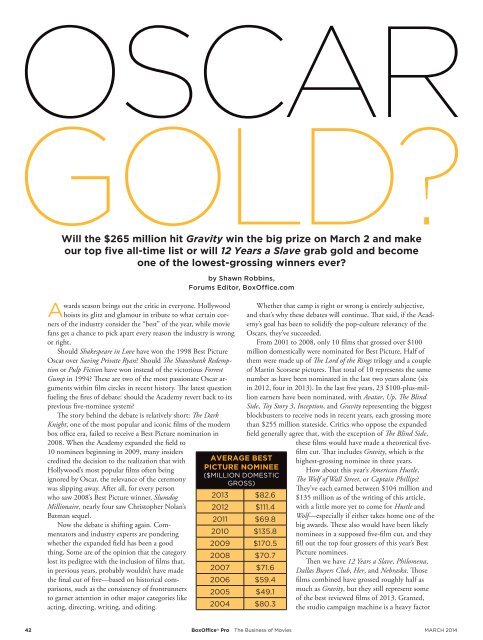Create successful ePaper yourself
Turn your PDF publications into a flip-book with our unique Google optimized e-Paper software.
Will the $265 million hit Gravity win the big prize on <strong>March</strong> 2 and make<br />
our top five all-time list or will 12 Years a Slave grab gold and become<br />
one of the lowest-grossing winners ever?<br />
Awards season brings out the critic in everyone. Hollywood<br />
hoists its glitz and glamour in tribute to what certain corners<br />
of the industry consider the “best” of the year, while movie<br />
fans get a chance to pick apart every reason the industry is wrong<br />
or right.<br />
Should Shakespeare in Love have won the 1998 Best Picture<br />
Oscar over Saving Private Ryan? Should The Shawshank Redemption<br />
or Pulp Fiction have won instead of the victorious Forrest<br />
Gump in 1994? These are two of the most passionate Oscar arguments<br />
within film circles in recent history. The latest question<br />
fueling the fires of debate: should the Academy revert back to its<br />
previous five-nominee system?<br />
The story behind the debate is relatively short: The Dark<br />
Knight, one of the most popular and iconic films of the modern<br />
box office era, failed to receive a Best Picture nomination in<br />
2008. When the Academy expanded the field to<br />
10 nominees beginning in 2009, many insiders<br />
credited the decision to the realization that with<br />
Hollywood’s most popular films often being<br />
ignored by Oscar, the relevance of the ceremony<br />
was slipping away. After all, for every person<br />
who saw 2008’s Best Picture winner, Slumdog<br />
Millionaire, nearly four saw Christopher Nolan’s<br />
Batman sequel.<br />
Now the debate is shifting again. Commentators<br />
and industry experts are pondering<br />
whether the expanded field has been a good<br />
thing. Some are of the opinion that the category<br />
lost its pedigree with the inclusion of films that,<br />
in previous years, probably wouldn’t have made<br />
the final cut of five—based on historical comparisons,<br />
such as the consistency of frontrunners<br />
to garner attention in other major categories like<br />
acting, directing, writing, and editing.<br />
by Shawn Robbins,<br />
Forums Editor, BoxOffice.com<br />
AVERAGE BEST<br />
PICTURE NOMINEE<br />
($MILLION DOMESTIC<br />
GROSS)<br />
2013 $82.6<br />
2012 $111.4<br />
2011 $69.8<br />
2010 $135.8<br />
2009 $170.5<br />
2008 $70.7<br />
2007 $71.6<br />
2006 $59.4<br />
2005 $49.1<br />
2004 $80.3<br />
Whether that camp is right or wrong is entirely subjective,<br />
and that’s why these debates will continue. That said, if the Academy’s<br />
goal has been to solidify the pop-culture relevancy of the<br />
Oscars, they’ve succeeded.<br />
From 2001 to 2008, only 10 films that grossed over $100<br />
million domestically were nominated for Best Picture. Half of<br />
them were made up of The Lord of the Rings trilogy and a couple<br />
of Martin Scorsese pictures. That total of 10 represents the same<br />
number as have been nominated in the last two years alone (six<br />
in 2012, four in 2013). In the last five years, 23 $100-plus-million<br />
earners have been nominated, with Avatar, Up, The Blind<br />
Side, Toy Story 3, Inception, and Gravity representing the biggest<br />
blockbusters to receive nods in recent years, each grossing more<br />
than $255 million stateside. Critics who oppose the expanded<br />
field generally agree that, with the exception of The Blind Side,<br />
these films would have made a theoretical fivefilm<br />
cut. That includes Gravity, which is the<br />
highest-grossing nominee in three years.<br />
How about this year’s American Hustle,<br />
The Wolf of Wall Street, or Captain Phillips?<br />
They’ve each earned between $104 million and<br />
$135 million as of the writing of this article,<br />
with a little more yet to come for Hustle and<br />
Wolf—especially if either takes home one of the<br />
big awards. These also would have been likely<br />
nominees in a supposed five-film cut, and they<br />
fill out the top four grossers of this year’s Best<br />
Picture nominees.<br />
Then we have 12 Years a Slave, Philomena,<br />
Dallas Buyers Club, Her, and Nebraska. Those<br />
films combined have grossed roughly half as<br />
much as Gravity, but they still represent some<br />
of the best reviewed films of 2013. Granted,<br />
the studio campaign machine is a heavy factor<br />
42 BoxOffice ® <strong>Pro</strong> The Business of Movies MARCH <strong>2014</strong>

















